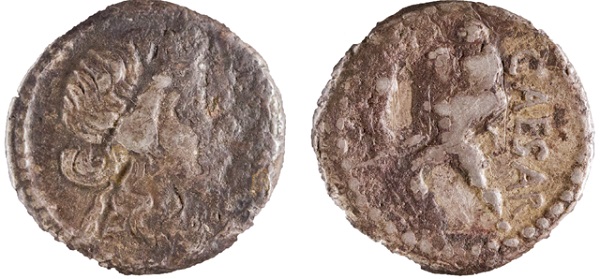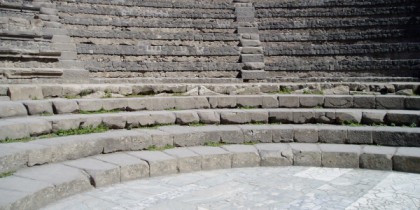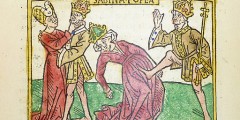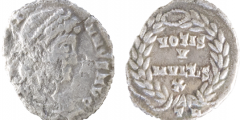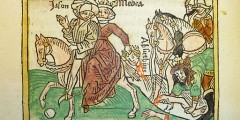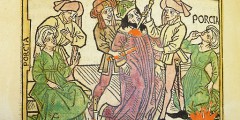Caesar Crosses the Rubicon!
January 10, 2015
As part of the Nottingham ‘Anniversaries through Coins’ project, Michael Welbourn reports how, on this day the tenth of January, in 49 BC, Julius Caesar crossed the river Rubicon and precipitated the final crisis of the Roman republic. Tracing the roots of this momentous decision requires us to go back eleven years to 60 BC. …
Coming Soon: Theatre with a Classical Connection…
January 7, 2015
Lynn Fotheringham has been searching out theatrical productions with a classical connection over the next few months, in Nottingham, nearby cities and London. Sheffield, 13th February only, 13.00: Phaedra’s Love, semi-staged reading as part of a season of the complete works of Sarah Kane, whose reputation for writing plays with lots of on-stage violence suggests …
Drama or History?
December 15, 2014
Victoria Moore, a part-time student on the MA in The Visual Culture of Classical Antiquity, reflects on her experience of The Coronation of Poppea by Monteverdi, performed by Opera North at the Royal Theatre, Nottingham. I have to say that I am not familiar with any of Monteverdi’s operas, so my main expectation was of …
Julian ‘the Apostate’ Comes to Power
December 11, 2014
As part of the Nottingham Anniversaries through Coins project, Robert Stone describes how on this day, 11th December, in 361, the last pagan emperor Julian II (also known as Julian the Apostate) entered Constantinople as the sole ruler of the Roman Empire. Following the death of Constantine I (337), the Empire was divided between his …
The Lex Titia…
November 26, 2014
As part of the Nottingham Anniversaries through Coins project, Mike Welbourn describes how, on this day, 26th November, in 43 BC, the lex Titia was passed at Rome. By this law a board of three men was given complete control over the Roman state. The lex Titia turned Rome into a de facto dictatorship, and …
We have two blog entries today, both from doctoral students in Classics: in the first, Peter Davies, reflects on the legacy of the poet Simonides’ words in commemorating the fallen…
November 11, 2014
After the battle of Thermopylae – immortalised by Herodotus and, in our own time, given new fame by Snyder’s epic 300 – the Lyric poet Simonides wrote an encomium for the Greek dead. In 1838 John Sterling would translate some of his words thus: Of those who at Thermopylae were slain, Glorious the doom, and …
Enjoying Receptions of Athenian Tragedy
November 2, 2014
Larissa Ransom, who is studying for an MA in Classical Literature, has recently seen Pilot Theatre’s Antigone, National Theatre Live’s Medea and Broadway Theatre Archive’s Antigone. Here she muses on how this has changed her thinking about Greek tragedy… It is commonly believed that much of a book is lost when turned into a …
Tig, You’re It
October 17, 2014
Lynn Fotheringham, Director of the Centre for Ancient Drama and its Reception (based in the Classics Dept at Nottingham University), reviews Pilot Theatre’s current production of Antigone. Pilot Theatre’s production of Sophocles’ Antigone (in a new version by Roy Williams) came to the Lakeside in the same week that we were covering screen-versions of Greek …
The Spirit and the Argonauts Myth
September 28, 2014
Helen Lovatt finds some surprising references to classical Greek myth in The Spirit, a recent film by Frank Miller (author of 300)… When I sat down to watch a film the other night, I was happily anticipating a complete break from work. But perhaps it should not surprise me to find The Spirit (2008), directed …
Greek for the Globe
September 21, 2014
Requests for translation into ancient Greek are understandably rare. But one was passed on to Oliver Thomas recently from a friend-of-a-friend at the Globe Theatre. For their production of Julius Caesar the Globe’s creative team wanted to mark the three main deaths (those of Caesar, Brutus and Cassius) by adding a small female chorus of …

